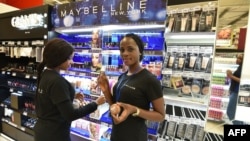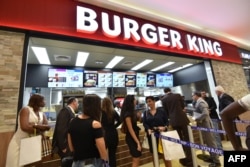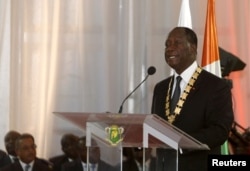Ivory Coast inaugurated a huge new shopping mall last month, a further sign that the former economic jewel of West Africa may be regaining its sparkle.
When the latest shopping mall opened in Ivory Coast’s economic capital Abidjan, President Alassane Ouattara himself was at the inauguration. The commercial center sprawls across 20,000 square meters and is the biggest of its kind in the West Africa sub-region.
The mall includes the first regional stores by French retailer Carrefour and American fast food chain Burger King.
These are just the latest examples of foreign investments in the country, whose economy is bouncing back five years after post-election unrest claimed the lives of 3000 people.
With an average annual growth of 9 percent in the past four years, the country has become the rising economic star in West Africa.
A few days ago, the Center for the Promotion of Investment in Ivory Coast, or CEPICI, was holding an assessment of its activities in 2015. And the mood was good.
On stage, CEPICI general manager Esmel Emmanuel Essis thanks a Moroccan investor who is about to create another multi-million dollar project in the country.
Direct foreign investment made up an estimated 69 percent of the total investment in Ivory Coast during 2015, said Essis. Fears of political volatility were unfounded.
"Some were saying there would be no investment in Ivory Coast in 2015 during the presidential election period. Investors get worried, but it’s our role to show them that hope exists. The president proved that the elections were free, fair and peaceful," said Essis.
In November, Ouattara, a former economist, was re-elected on the promise that he will make Ivory Coast an emerging country by 2020.
New investment code
Ivory Coast is the world's leading cocoa producer, and the government has been investing in big infrastructure projects and implementing reforms to try to improve the business environment, including the adoption of a new investment code.
The International Monetary Fund's representative in Ivory Coast, Alain Feler, says the economic recovery is also due to a sense of relief after years of crisis.
"When you are down, and you come up, it gives you an element of rebound... a good environment also helps. If you have good policies to take advantage of it, it adds to that performance," said Feler.
Feler says the next challenge for Ivory Coast is to sustain that momentum.
"It’s important to take good advantage of environment, but also prepare for volatility, tougher times in the future. There is a great potential, but the challenge also to be able to make it sustainable for a long time, and this is what will actually make a transformation for Côte d’Ivoire," he said.
The IMF has forecast that Ivory Coast's GDP will grow again this year, by 8.6 percent.







